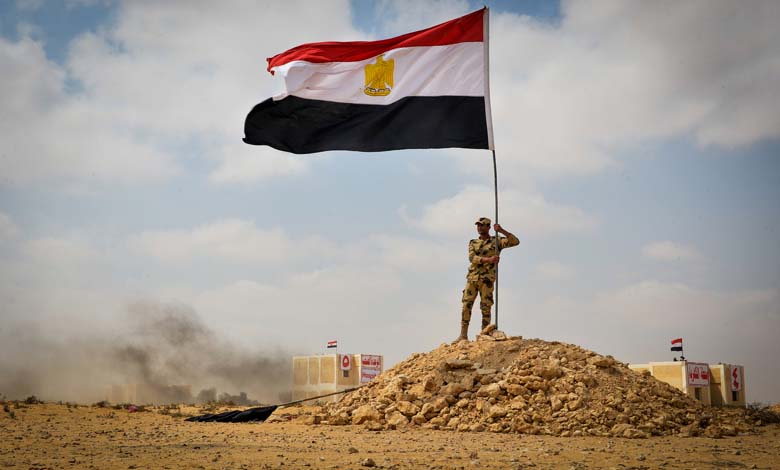Israel Applies Political Pressure to Curb Egypt’s Armament Plans

The Hebrew-language magazine Epoch has confirmed that the Israeli government has warned about Egypt’s growing technological support from Beijing in the field of advanced air defense systems.
-
What is the Relationship between the Founding of the Muslim Brotherhood in Egypt, Iraq, Syria, and the Greater Israel Project?
-
Stalled Gaza Truce Talks… The Israeli Withdrawal Map Sparks Fresh Tensions
Amid rising regional tensions and rapid military shifts in the Middle East, Israel’s political and security circles are increasingly concerned by Egypt’s efforts to modernize its military capabilities, particularly in air defense and ballistic missile systems. Despite a longstanding peace agreement between the two countries, Israel views Egypt’s potential military advancements as a strategic challenge that cannot be overlooked, especially given the involvement of global powers such as China and Iran in this sensitive issue.
According to a report by Israel’s Epoch political magazine, the Israeli government has already begun taking political steps to contain what it views as an “unjustified expansion” of Egypt’s military power. The report cites Israeli security sources stating that Tel Aviv regularly raises its concerns in closed meetings with senior U.S. administration officials, warning against Egypt’s increasing technological cooperation with China—and at times Iran—in advanced air defense systems.
-
Explosive scandal shakes Tebboune’s Regime… Algeria supplies gas to Israel via Egypt
-
Hasm Resurfaces: Training Video Raises Fears of New Threat to Egypt
The report highlights that Israel is particularly focused on Egypt’s missile development programs and the modernization of its air defense systems with technologies that may rival those of systems like the Patriot or S-400. Although Israel does not view these developments as an immediate threat, it sees them as long-term game changers that could complicate its maneuvering or deterrence capabilities in the event of a large-scale regional conflict.
Similarly, Israel Defense—a military-affiliated magazine—shed light on a recent deal signed by Cairo to acquire China’s advanced HQ-9B air defense system, which is based on Russian technology. The magazine described the deal as “a major step toward enhancing Egypt’s ability to protect its airspace from potential threats.”
-
Israel Seeks to Block a Promising Deal to Develop Egypt’s Air Force
-
Egyptian Initiative to Convince Washington on Gaza Reconstruction Plan
The system, noted for its long range and ability to intercept cruise missiles and stealth aircraft, enhances Egypt’s potential to establish new deterrence dynamics in the skies of the Middle East. Israeli experts view this as a strategic shift that could place Israel in a non-traditional deterrence equation, especially if paired with the development of precision-guided offensive missiles.
Israel’s concerns are not new, but they have become more pronounced in recent years. In a previously controversial statement, former Israeli ambassador to the United Nations Danny Danon questioned the rationale behind Egypt’s heavy armament with submarines and tanks, stating that “the quantity and quality raise suspicions.”
-
After 8 Months of Closure… Here’s the Date for the Reopening of the Rafah Crossing between Egypt and Gaza
-
Media Recalls the Crimes of the Muslim Brotherhood and Their Attempt to “Burn Egypt”
Danon went beyond merely expressing concern—he called on the U.S. administration to reconsider its military aid to Cairo, arguing that the continued enhancement of the Egyptian military does not align with what he described as the “necessary military balance” in the region.
Despite the noise in Israeli media, Cairo has remained silent on these reports, issuing no official statements about recent air defense acquisitions or technical partnerships with foreign actors. Observers believe this silence is part of a deliberate Egyptian strategy aimed at strengthening its military capabilities without engaging in media confrontations, particularly amid the serious internal and border security challenges the country faces.
-
An Expert Reveals the Plans and Names of Muslim Brotherhood Centers Targeting the Region and Egypt
-
Egypt Refuses to Host a New Round of Truce Negotiations
Israeli security sources claim this “deliberate Egyptian ambiguity” heightens Tel Aviv’s anxiety, as intelligence circles fear that some missile development projects may involve cooperation with actors unfriendly to Israel—namely China and Iran.
Although diplomatic and security relations between Cairo and Tel Aviv are among the most stable in the region since the Camp David Accords in 1979, Israel continues to view Egypt as a “sleeping power” that, if it awakens militarily, could become a central regional player competing for influence and potentially obstructing Israel’s military freedom in certain strategic scenarios.
-
“Year of Lies and Blood”: Major Terrorist Crimes Committed by the Muslim Brotherhood in Egypt
-
Rumors of the Muslim Brotherhood Reach Raba’a and Nahda… Egypt Denies
As Israel remains engaged in multiple conflicts with unconventional forces such as Hezbollah and Iran, its aerial and intelligence superiority has long been its main safeguard. Any enhancement of defensive capabilities by a major neighboring state—even one with a peace treaty—is therefore viewed as a limiting factor.
The region appears to be entering a phase of redefined power balances. While the United States tries to maintain influence among its allies, powers like China are filling the gaps through military and economic deals with pivotal countries like Egypt. This international entanglement in defense matters deepens Israeli concerns, as the country has long held military dominance in the region.
In this light, the relationship between Cairo and Tel Aviv will remain subject to ongoing tests—not due to political disputes, but due to shifting power dynamics and the broader struggle for regional influence, at a time when military alliances seem less stable than ever before.












